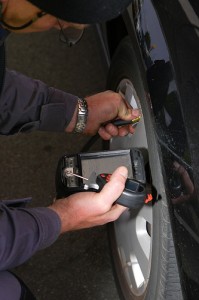 Even with mass communication as powerful as the Internet, it’s still possible (and perhaps much easier than ever) to disseminate misinformation and untruths. The topic of nitrogen tire inflation is no exception to this, and we’re committed to busting myths and eliminating the untruths that circulate online, even if we have to bust certain myths more than once and really drive home a few key concepts. Here are some old, and new, untruths about nitrogen-filled tires, and what the truth really is.
Even with mass communication as powerful as the Internet, it’s still possible (and perhaps much easier than ever) to disseminate misinformation and untruths. The topic of nitrogen tire inflation is no exception to this, and we’re committed to busting myths and eliminating the untruths that circulate online, even if we have to bust certain myths more than once and really drive home a few key concepts. Here are some old, and new, untruths about nitrogen-filled tires, and what the truth really is.
If you have a nitrogen-filled tire that needs air and you top off with regular air, you’ve negated any of the benefits you had gained. (Because so few places have nitrogen equipment, you’ll often find yourself seeking out a regular air pump at a gas station.)
Absolutely not true. It’s not as if topping off an air-filled tire with nitrogen benefits your tire like a tire filled 100 percent with nitrogen. Granted, topping off a nitrogen-filled tire with air isn’t the best, but you don’t negate all the benefits. Just because it’s harder to top off with nitrogen doesn’t mean that nitrogen tire inflation isn’t worthwhile.
A while ago, I replaced the air in my tires with nitrogen at a cost of $20. Now I’ve noticed that I’m getting about 40 miles less per tank of gas. Can nitrogen cause a drop in gas mileage?
Anyone who says that with nitrogen tire inflation, you don’t have to worry about tire pressure ever again, is lying. Nitrogen tire inflation maintains proper tire pressure for a longer period of time, but it doesn’t keep your tires properly inflated forever. It’s not the nitrogen that ruins your gas mileage, its the underinflated tires. You still have to check them regularly, even if it’s just to make sure you don’t have a leak. As the myth says, tires that are underinflated will diminish your fuel efficiency.
The other argument for nitrogen over air is that oxygen within normal air causes ‘oxidation’ within the tire. However, I haven’t seen any concrete evidence as to what oxidation really is or why its such a bad thing.
Oxidation is the interaction between oxygen molecules and other elements. It’s what causes an apple to turn brown, unopened food to spoil after a long period of time on the shelf, metal to rust, and rubber (such as the rubber in tires) to deteriorate. If any of those examples don’t count as concrete evidence, than I don’t know what does. Just because we typically call it rust or rotting doesn’t mean that oxidation doesn’t exist or is some fancy scientific principle that’s too difficult for normal people to understand.
The advantage of nitrogen being more stable and less prone to changes in pressure due to heat in the tires seems of little benefit to average drivers.
Not true. Sure, normal drivers aren’t driving under the extreme conditions that NASCAR drivers and airplane pilots do. Both use nitrogen-filled tires on a regular basis, and are right to do so because there are much more extreme temperature changes than in daily life. However, just because the temperature changes aren’t extreme doesn’t mean that they don’t happen in daily life, and it doesn’t mean that those less extreme changes don’t make a difference in handling and tire pressure. Since nitrogen better handles these changes, it means that a driver will get more accurate readings of his/her tire pressure, and will less likely overinflate/underinflate their tires unnecessarily. More stability also means a safer tire, one that is less likely to suffer a blowout.





